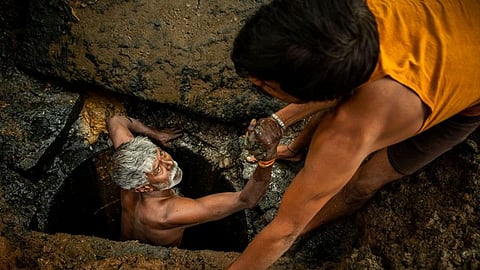
- Topics
- Feature
- Opportunities & Events
- About
- Hindi Portal
- Data
- Topics
- Feature
- Opportunities & Events
- About
- Hindi Portal
- Data

Many of the challenges sanitation workers face, stem from their lack of visibility in society, says a report ‘Health, Safety and Dignity of Sanitation Workers’ produced jointly by The World Bank, International Labour Organization (ILO), WaterAid and the World Health Organization (WHO). The report examines nine case studies of sanitation workers in low and middle-income countries, who empty pits and tanks, transport faecal sludge and perform sewer maintenance.
It describes the workforce as “invisible, unquantified, and ostracized” and insists that many of the challenges that sanitation workers face stem from a lack of acknowledgment for what they do. While the workers include full-time employees with health benefits, pensions and legal protection, a significant proportion comes from some of the “most marginalized, poor and abused members of society”.
The report insisted that while the workforce performs an essential public service, their own health is compromised and they are often shunned. All that is on offer for these people is “low-grade, labour-intensive and dangerous work”, the report continues, highlighting the hazardous biological and chemical agents they encounter in dangerous environments.
“It is only when those critical services fail, when society is confronted with faecal waste in ditches, streets, rivers, and beaches or occasional media reports of sanitation worker deaths, that the daily practice and plight of sanitation workers come to light,” says the report.
They are far too often invisible, unquantified, and ostracized, and many of the challenges they face stem from this fundamental lack of acknowledgment. The report also highlights where sanitation work has been officially acknowledged and formalized, citing South Africa as an example, where public and private employees follow national labour standards and has proper equipment and training.
These findings draw on evidence of sanitation working conditions in nine countries: Bangladesh, Bolivia, Burkina Faso, Haiti, India, Kenya, Senegal, South Africa, and Uganda. The working conditions of the sanitation workforce depend heavily on the wider sanitation and urban landscape, but there are commonalities, particularly in the challenges some of the most vulnerable sanitation workers face.
Efforts to prohibit manual emptying (for example, in India and Senegal) have not necessarily curtailed the practice but instead have forced it underground. By contrast, in Bangladesh and South Africa, manual work is formally recognized as part of the sanitation services package, with workers being provided training and occupational health mitigation measures being in place.
Note:
The World Bank allows the sharing of the summary of the report for dissemination purposes, for non-commercial purposes.
World Bank, ILO, WaterAid, and WHO. 2019.“Health, Safety and Dignity of Sanitation Workers: An Initial Assessment.” World Bank, Washington, DC.